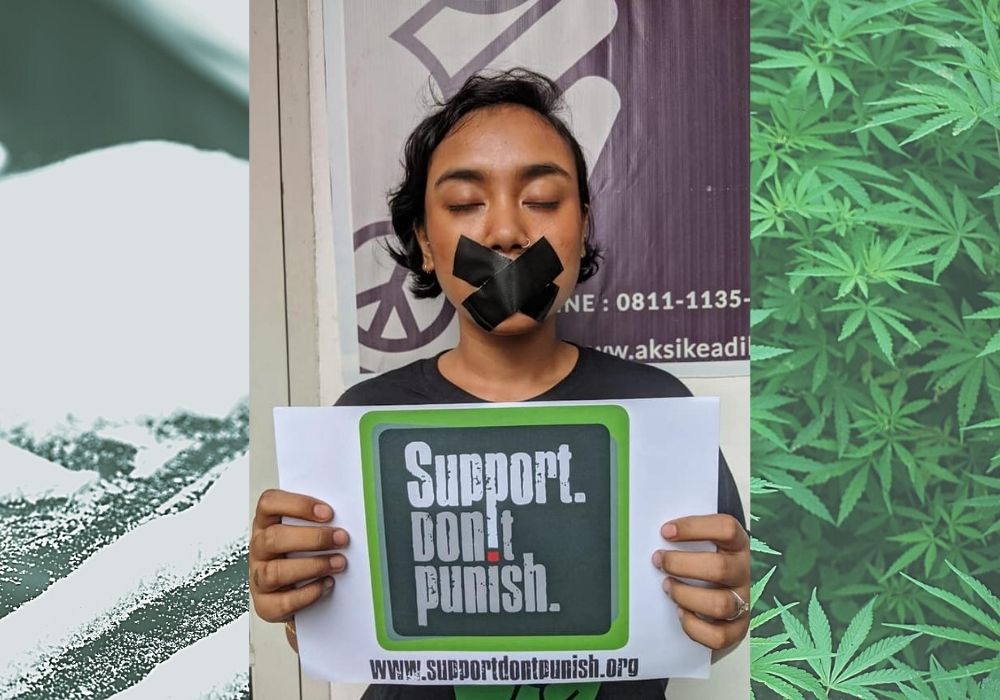Bambang Yulistyo Dwi Mulyanto aka Tedjo, 48, has dealt with the judicial system more times than he would’ve liked as a drug user. It started when he was a senior high school student in his hometown of Solo, Central Java.
“I was arrested for using marijuana in 1991, but the case was closed because cops accepted bribe money from my family. I was only detained for 16 days,” Tedjo said.
Eighteen years later, he was caught with a gram of heroin and sentenced to one year and three months in Semarang. In 2013, he was arrested for marijuana use and jailed for one year and four months at Wirogunan prison, Yogyakarta.
Rosma Karlina, 42, was also a repeat drug offender. In 2005, she was charged with heroin abuse and trafficking. At the time, she said law enforcement officers extorted her family over her arrest.
“My family was told to pay a certain amount of money so that I wouldn’t be jailed for more than five years,” Rosma said.
She was eventually sentenced to three years in prison, yet only served 20 months at Paledang correctional institution in Bogor after she was granted conditional release and a sentence remission.
As a former female drug offender, Rosma was doubly stigmatized by society, given that she didn’t only break the law but was also perceived as having failed to behave responsibly as a woman.
“A law enforcement officer sarcastically asked me if a female drug addict was able to take care of her child,” she said.
Her first born also bore the brunt of judgement from society.
“One day he asked me, while crying, why his friends were not allowed [by their parents] to play with him,” she recalled.
Tedjo was disowned by his family before he decided to leave his hometown.
“I used drugs from 1991 to 2013. Because of the impact of my consumption, I kept making a mess [of my life]. It was normal that they rejected me. I tried to accept it, then I moved to Bogor in January 2015,” he explained.
In Bogor, Tedjo visited Rumah Singgah PEKA (PEKA Halfway House), a rehabilitation center, to undergo free addiction treatment.
“Their motto is, ‘when the whole world rejects you, stop by at PEKA Halfway House.’ My family and friends welcomed me back when I no longer used drugs. So, it took some time [to fix my relationships with family and friends],” he said.
Today, Tedjo and Rosma work at an NGO called Aksi Keadilan Indonesia (Indonesian Justice Act), which provides support for drug users and advocates for their decriminalization. Tedjo serves as program manager, while Rosma is the coordinator of women’s affairs.
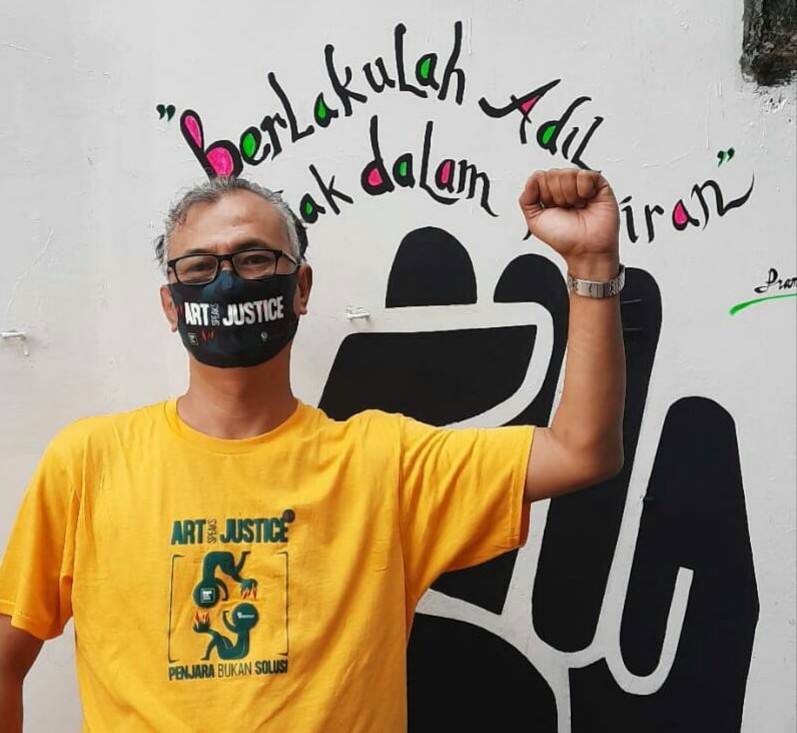
Punitive approach to drug users is ineffective and generates many problems. In addition, many legal procedures still aren’t carried out in accordance with the law, which create plenty of openings for transactional corruption.
Indonesia’s Law No. 35/2009 on Narcotics has been in effect for 11 years but the implementation is far from satisfactory. Activists have been demanding for its revision and for policies penalizing drug use to be revoked.
Rehabilitation isn’t always the solution
In theory, the narcotics law provides the opportunity for the rehabilitation of drug users before incarceration, but the opposite is often true in reality.
Based on the law, users are divided into three categories, namely abuser, victim of abuse, and addict. “Abuser” means any person who unrightfully or unlawfully consumes narcotics. “Addict” pertains to any person who is either physically and/or psychologically dependent on narcotics. “Victim of abuse” refers to any person who inadvertently uses narcotics because they were persuaded, tricked, deceived, coerced, and/or threatened.
Muhammad Afif Abdul Qoyim, public defender and the director of Community Legal Aid Institute (LBH Masyarakat), argued the law doesn’t accurately portray types of drug users.
“The terms ‘addict, abuser, and victim of abuse’ are confusing. There are people who consume narcotics for their own recreational needs or merely use it occasionally. Also, there are others who aren’t included in the law,” Afif said.
The law states that addicts and victims of abuse are required to undergo medical and social rehabilitation at community health clinics, hospitals, and/or medical and social rehabilitation institutions appointed by the government.
To ensure compliance, the government has set up a body called the Compulsory Report Institution (IPWL), which records rehabilitation attendance. Yet even with that, and the fact that the law states that anyone undergoing up to two periods of medical rehabilitation is exempt from criminal prosecution, law enforcement often unjustly intervenes.
“I reported myself to IPWL as an addict. Nevertheless, when I was involved in drug use [in 2013], the investigation [into my case] continued,” said Tedjo.
Police corruption in drug cases is a pervasive and entrenched problem. Since 2018, Aksi Keadilan Indonesia has received more than 50 complaints from drug users in the Greater Jakarta Area whose cases were only closed after they were tricked into paying money to swap the threat of jail for rehabilitation.
“They were forced to pay between IDR30 million and IDR100 million even though there was no evidence in some cases,” Tedjo said.
Rehabilitation centers were complicit in this wrongdoing. Often, police officers file rehabilitation requests on drug users’ behalf, whether the users want to or not.
“The users or their family were forced to sign the letter requesting rehabilitation. The money would then be handed over to the centers. We don’t know what the money is used for. This is unclear and it raises suspicions, whereas, according to some regulations issued by law enforcement agencies, rehabilitation for people whose cases are closed is free,” he added.
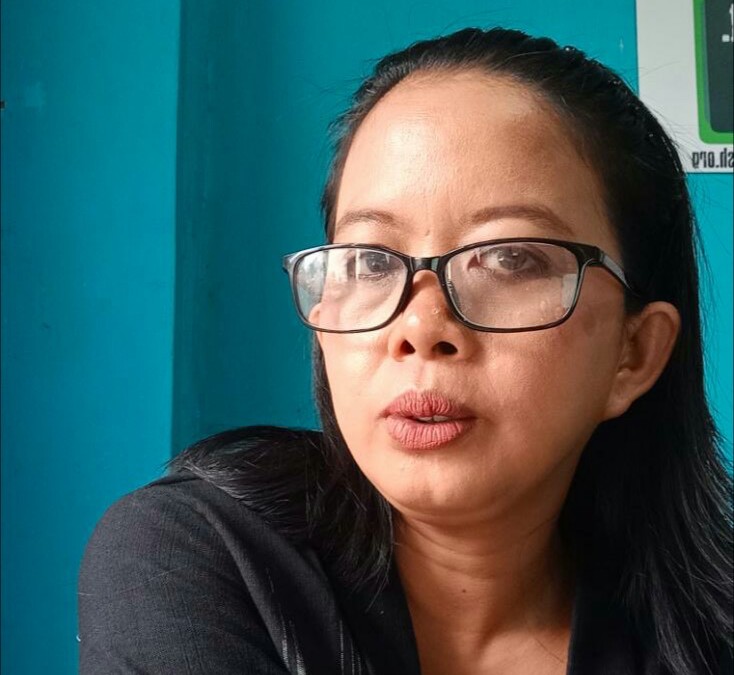
Although compulsory rehabilitation is often touted as a solution, it’s hugely problematic from the perspective of one’s right to health. The narcotics law only regulates rehabilitation, but there are no measures on how to implement a more holistic approach that meets the diverse needs of the users.
“If addicts are required to undertake compulsory rehabilitation, they are not free to choose the treatment that is most suitable for them,” said Afif.
“When drug users enter a rehabilitation center and inpatient care, they will be disconnected from their surroundings, workplace, and/or educational institutions.”
To treat addiction, the majority of centers in Indonesia require patients to quit their addiction cold turkey, which is deemed controversial.
“Most centers still implement an abstinence-based approach even though there is a high possibility for relapse among drug addicts,” he added.
Drug offenders dominate prison population
Prison overcrowding has long been a severe problem in Indonesia. The suffocation in cells was such that the Ministry of Law and Human Rights released tens of thousands of prisoners and detainees in April to reduce the spread of coronavirus. As of March 31, prior to the implementation of the release policy, official data showed there were 270,466 people in detention centers and correctional institutions — more than double the country’s official total holding capacity — including 94,626 drug dealers and 47,674 users.
Compared to March, there was a slight decrease in the number of inmates and people in custody at the end of July (233,864). Drug offenders accounted for a little more than 50 percent of all detainees and convicts (122,910), and almost one third of them are users.
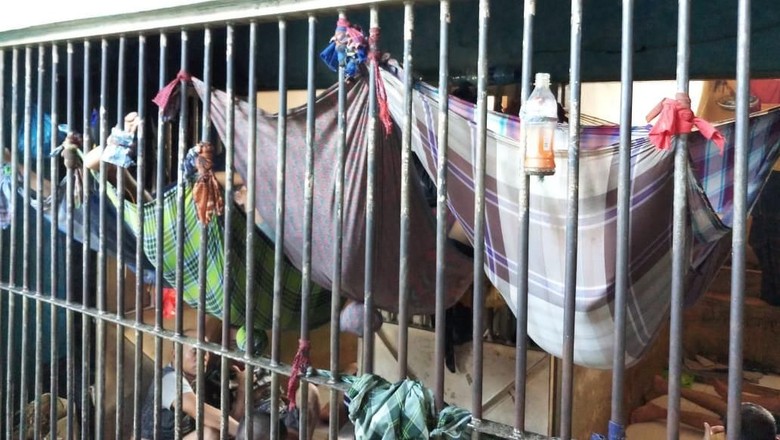
It’s no surprise that prisons are a safe haven for narcotics transactions.
“Dealers, couriers, and users reunite in prison. So, there’s a demand for narcotics,” said Tedjo.
Rosma knows all too well about life inside an overcrowded incarceration facility.
“At Paledang prison there is only one block designated for women. When I was imprisoned, the block had a capacity of 65, but there were 100 convicts in total. I didn’t see any transaction before my eyes, but I saw people using drugs,” she said.
Basic female hygiene requirements were unmet at the prison.
“Inmates rely on visitors to bring them sanitary pads. However, some prisons prohibit sanitary pads from the outside over drug smuggling concerns. If they need it, they have to purchase it at the canteen or use a tampon instead,” she said.
In her current job and in the past, Rosma has seen for herself how pregnant women in prison face especially difficult circumstances.
“They don’t receive good nutrition during pregnancy. They also have to bear the cost of childbirth. When I was at Paledang, they were admitted to a community health center [Puskesmas] to deliver their baby. Only a few hours after that, the mother and her newborn had to be separated due to lack of facility for either of them,” she explained.
Rosma noted that nowadays, in women’s prisons, children can reside with their mother until they reach the age of two. While this establishes a bond between mother and child, it poses a problem as a prison is not an appropriate environment to raise a child.
Decriminalization is key
Activists have been calling for the decriminalization of drug use for years. To achieve this, they have been pushing for a revision to the narcotics law. The proposed revision has entered the House of Parliament’s National Legislative Program (Prolegnas) as a priority bill for 2020.
“In countries with progressive drugs policies, the circulation of narcotics is well regulated. Drug users aren’t scared by punitive policies. The law shouldn’t be used to criminalize them,” Afif said.
Ending the excessively harsh approach against drug users won’t happen as long as the state budget contributes to punitive policies.
“In the 2020-2024 National Medium-Term Development Plan, the police, as an institution, is required to meet a target of solving a certain number of drug cases. The state should avoid allocating a budget to fund punitive policies,” he explained.
Tedjo supports the decriminalization of drug use but warned it will not come easy.
“Decriminalization is a dream for drug users throughout Indonesia yet there are many people whose political interests would be threatened if this were actually implemented,” he said.
Decriminalization will, in theory, pave the way for legalization.
“If decriminalization is implemented, it could entail legalization since the state will stop enforcing a prohibitive approach,” said Afif.
And that could be beneficial to many, even the state.
“The state will benefit economically from properly regulated narcotics. For drug users, having a guaranteed product and implementation of quality control will reduce overdose and mortality [from narcotics],” Tedjo said.
Currently, the legalization of narcotics for health, science, and technology is still hampered by the narcotics law. For example, one article prohibits type-1 narcotics — substances under the strictest control, including marijuana — for medical use. Only a small amount of type-1 narcotics can be used for the purposes of scientific and technological development.
A group of organizations under the Advocacy Coalition for Narcotics Usage for Medication plans to file for a judicial review against articles related to type-1 narcotics at the Constitutional Court. For the time being, the plan hasn’t moved forward due to the ongoing COVID-19 pandemic.
“We would like to file for a judicial review so that type-1 narcotics, including marijuana, are allowed to be used for health, science, and technology. Thailand has legalized cannabis for medical use, ending prohibitive marijuana regulations. Essentially, control over narcotics should be based on science,” Afif said.
In 2017, one man named Fidelis Arie Sudewarto inadvertently became an icon for decriminalizing marijuana in the country after he grew marijuana to treat his dying wife. His wife died following his arrest, and Fidelis was eventually sentenced to eight months in prison.
Though Fidelis’ final sentence was still harsher than what his supporters or even the prosecution had hoped for, which partly owed to immense public support towards him, it could still be considered a merciful one as Indonesia’s notoriously harsh drug laws carry a maximum charge of a life sentence for the crime.
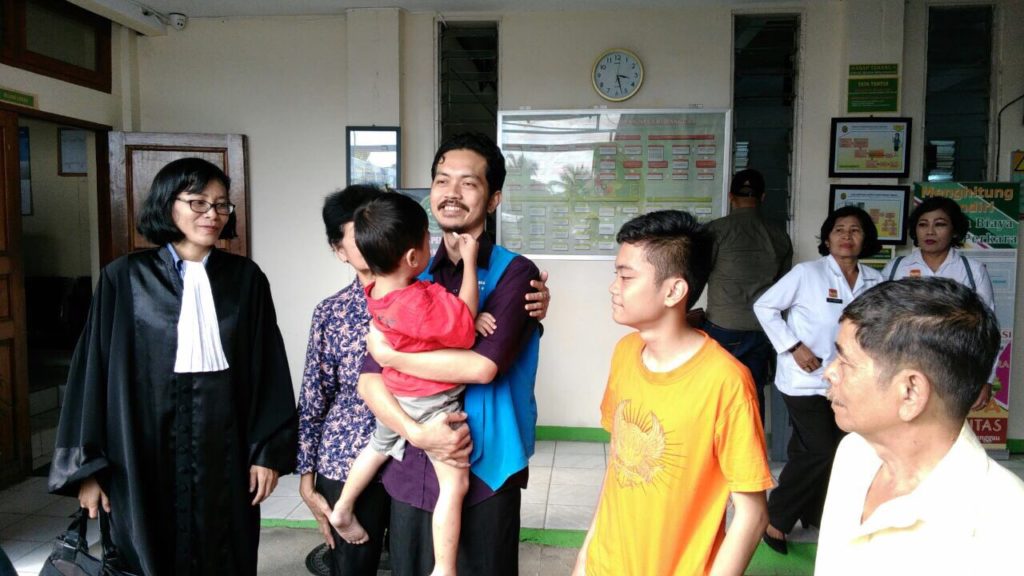
On the extreme scale, executing drug traffickers, for which Indonesia has been criticized internationally, has been chided as an ineffective measure. In recent years, the executions to battle what the government describes as Indonesia’s growing “drug emergency” seems to have done nothing to stop the increasing number of drug users in the country (according to the government’s own data). Many experts, including those in this article who are advocating for a more progressive approach towards narcotics, argue that the real problem is in fact the rampant corruption in Indonesia’s prisons, legal system, and law enforcement agencies.
